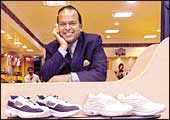 |
"We are continuing to expand our
supplier relations in India because of the positive response
we have had"
Raymond Bracy
VP (International Corporate Affairs)/Wal-Mart |
Last
July, when Wal-Mart first approached Himachal Pradesh-based pa
Time Industries to source inexpensive watches, it went about the
task quietly and methodically. After checking out the company's
manufacturing unit up north to start with, a team from Wal-Mart
sat down with pa's marketing honchos and went over product costing,
component by component. Where are the movements sourced from,
how much does the steel cost, what about the plating... Next,
Wal-Mart's director of finance flew down to Bangalore for a presentation,
followed by the product head. That done, another team of inspectors
paid a visit to the company's factory to look at its work practices:
are the workers being paid fair wages, are any children being
employed illegally, do working mothers have a crèche facility...
Eight months on, pa's sample watches are being tested at Wal-Mart's
technical factory in China. An approval is expected in April this
year.
If PA, which sells its watches under the
Maxima brand and claims to be the second-largest manufacturer
after Titan Industries, is putting itself through an elaborate
approval process without as much as a whimper, it's because of
the buyer in question. With annual revenues of $256 billion (Rs
11,26,400 crore, that's a little more than a third of India's
GDP or gross domestic product), the Bentonville-based retailer
is the world's biggest. Getting a foot in the Wal-Mart door can,
quite simply, transform the fortunes of a company. Take pa as
an example. While Wal-Mart hasn't confirmed how many watches it
will be buying every year, it has indicated that it could be in
excess of 1.5 million pieces-that's almost as much as the Rs 65-crore
company sells in India every year. "Wal-Mart approving your
quality and pricing means that you can easily become a global
supplier," says Manoj Sharma, Deputy General Manager (Product
Development & Marketing Co-ordination) of the company, which
hadn't thought of exports until it started talking to Wal-Mart.
 |
A preferred supplier to Wal-Mart,
Trident plans to invest Rs 350 crore to triple its terry towels
production capacity
Rajinder Gupta
CEO/Trident Group |
Happily for manufacturers in India, the retail
behemoth is stepping up sourcing in the country. Last year, it
bought $300 million (Rs 1,320 crore) worth of goods directly,
and this year the figure is set to jump to $400 million (Rs 1,760
crore). There's another $800 million (Rs 3,520 crore) worth of
goods it will be buying indirectly. The total figure of $1.2 billion
(Rs 5,280 crore) may still be minuscule compared to the $12 billion
(Rs 52,800 crore) it spends shopping in China every year, but
there's little doubt about its intentions. After basing its Asia
sourcing operations in Hong Kong for 25 years, Wal-Mart opened
an India office, which now boasts 50-plus employees and buys from
nearby countries too. Says Raymond Bracy, VP (International Corporate
Affairs): "Wal-Mart is continuing to expand its supplier
relations in India because of the positive experience it has had
(so far)."
At present, Wal-Mart sources a raft of products
from India. These range from cosmetic jewellery made by women
volunteers at the Tegh Foundation in Uttar Pradesh to pens made
by Linc Pens to terry towels manufactured at Trident Group's Ludhiana
factories. With Indian vendors willing to work with Wal-Mart on
quality, costs and manufacturing, the retailer is looking to widen
its India basket. Marine products, over-the-counter drugs, spices,
electrical products, garments and Indian foods are reportedly
on its shopping list.
 |
Liberty started by supplying EVA-soled
shoes to Wal-Mart, but is now moving into sports-shoes and
beach-shoes
Adesh Gupta
CEO/Liberty Group |
"Everyday" Challenge
At Bentonville, India is not just seen as
a back-up to China, but a country that has its own set of advantages.
In several categories such as footwear and jewellery, India has
a distinct edge over competing Chinese suppliers, both in terms
of volumes and production skills. Sources say that a high-powered
team led by Wal-Mart President & CEO, Lee Scott, was choppered
into Jalandhar and Karnal to visit factories of Liberty Shoes
and Bawa Shoes, and tie up large sourcing deals with them, especially
in areas such as injection-moulded footwear. This technology allows
multiple designs and colours to be produced in a short span of
time. "India has a history of 25 years in injection-moulded
footwear compared to three years of China," says a manufacturer.
 |
The Uttar Pradesh-based Tegh Foundation
supplies cosmetic jewellery to the retail behemoth
Kavinder Khanna
Head/Tegh Foundation |
Doing business with a retailer that's actually
helped curb inflation in the US is anything but easy. "There
isn't much room to manoeuvre with them... they look for large
volumes and strip you down to the bone in terms of margins,"
says the head of a large retail company. There's an elaborate
factory certification programme that suppliers must subject themselves
to. Wal-Mart's inspectors spend up to 12 days a month combing
through factory premises, looking for even the smallest slip-up.
"They look through everything, beginning from your overall
capability, effectiveness of pricing, ethical standards and supply
chain set-up," says Chand Bhalla, Managing Director of Mayur
Overseas, a supplier of women's apparel.
Just the same, everyone's tripping over themselves
to scale up operations with Wal-Mart in mind. The Trident Group,
a preferred supplier of terry towels, plans to invest Rs 350 crore
in tripling its production capacity from 9,000 tonnes to 30,000
tonnes per annum, besides spending $10 million (Rs 44 crore) or
so on acquiring towel brands in the US. Welspun, another supplier,
is in the process of doubling capacity to 100,000 towels a day
and is building a $110-million (Rs 484-crore) bed linen factory.
Linc Pens and Plastics, which sells an estimated 30 million pens
a year to Wal-Mart, has tied up with Mitsubishi Pens of Japan
for technology, and Liberty Shoes is reported to be designing
a range of beachwear and sportswear for the retailer. Liberty
will also begin production at its new facility in Uttaranchal,
where 25,000 pairs of footwear can be made daily, according to
sources. Says Linc Pen's Managing Director, Deepak Jalan: "With
the demise of quotas, Indian vendors should pick up more business
with Wal-Mart."
If that happens, convincing other global
retailers to start shopping in India would be a cinch.
|







